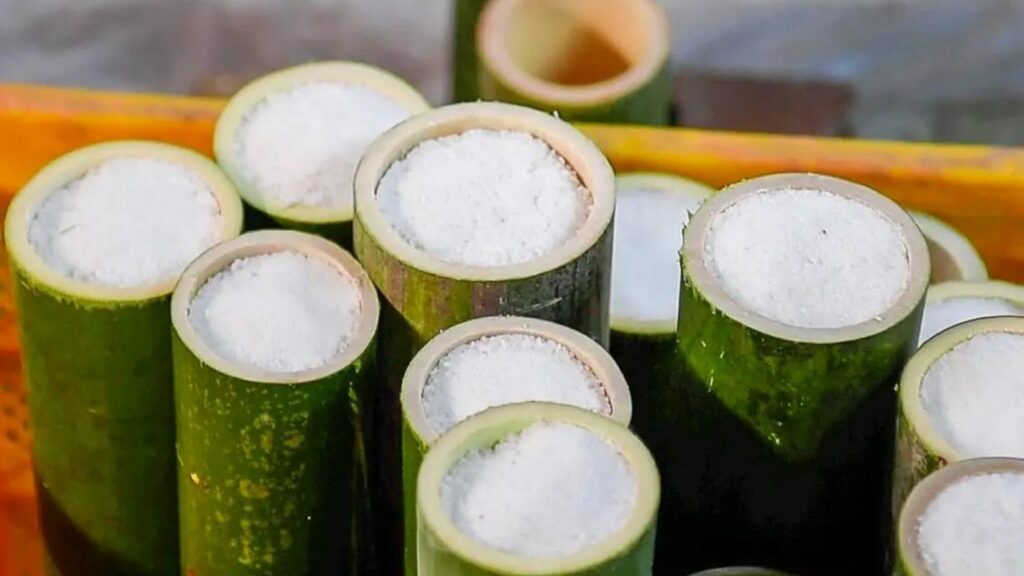
Introduction
Bamboo salt, a traditional Korean condiment with a rich history dating back centuries, is renowned for its unique production process and purported health benefits. Made by roasting sea salt in bamboo stalks sealed with yellow clay, bamboo salt undergoes a transformative journey, imbuing it with a complex flavor profile and potential therapeutic properties. In this in-depth exploration, we delve into the origins, production methods, nutritional components, culinary uses, and health benefits of bamboo salt, uncovering the secrets behind its cultural significance and culinary allure.
Origins of Bamboo Salt
The origins of bamboo salt can be traced back to ancient Korea, where it was developed by Buddhist monks seeking natural remedies and elixirs for healing and purification. Inspired by traditional Korean pottery techniques, these monks discovered that roasting sea salt in bamboo stalks sealed with yellow clay produced a uniquely flavorful and medicinal salt. Over time, bamboo salt became an integral part of Korean culture and cuisine, revered for its purported health benefits and spiritual significance. Today, bamboo salt remains a cherished tradition in Korea, passed down through generations and celebrated for its culinary and therapeutic properties.
Production Methods
The production of bamboo salt is a labor-intensive and meticulous process that involves several stages of roasting and refining. First, high-quality sea salt is packed into bamboo stalks, which are then sealed with yellow clay to prevent oxidation and contamination. The sealed bamboo stalks are roasted in a kiln at high temperatures, ranging from 800 to 1500 degrees Celsius, for several hours to several days, depending on the desired grade of bamboo salt. The intense heat transforms the sea salt into bamboo salt, infusing it with the unique flavors and minerals from the bamboo and clay. After roasting, the bamboo salt is carefully removed from the stalks, crushed into fine particles, and sifted to remove impurities, resulting in a pure and potent seasoning with a distinctive taste and aroma.
Nutritional Components of Bamboo Salt
Bamboo salt contains a rich array of minerals and trace elements derived from the bamboo, clay, and sea salt used in its production. These minerals, including calcium, magnesium, potassium, and iron, contribute to the nutritional profile of bamboo salt, enhancing its potential health benefits. Additionally, the roasting process imparts antioxidants and other bioactive compounds to bamboo salt, further augmenting its therapeutic properties. While the exact composition of bamboo salt may vary depending on factors such as the source of sea salt and the roasting technique used, it is generally regarded as a nutritious and flavorful seasoning with potential health-promoting effects.
Culinary Uses
Bamboo salt’s complex flavor profile and distinctive aroma make it a versatile seasoning that adds depth and complexity to a wide range of dishes. In Korean cuisine, bamboo salt is used to enhance the flavor of soups, stews, marinades, and sauces, as well as grilled meats, seafood, and vegetables. Its earthy and savory notes complement traditional Korean flavors and ingredients, while its subtle sweetness adds a delightful nuance to dishes. Bamboo salt can also be used as a finishing touch for salads, rice dishes, noodles, and snacks, imparting a burst of flavor and a touch of elegance to every bite. Additionally, bamboo salt’s potential health benefits make it a popular ingredient in wellness foods and functional beverages, where it is prized for its nutritional value and healing properties.
Health Benefits of Bamboo Salt
Bamboo salt is revered for its potential health benefits, which are attributed to its unique production process and mineral-rich composition. Proponents claim that bamboo salt possesses antioxidant, anti-inflammatory, and alkalizing properties, making it beneficial for various aspects of health and well-being. It is believed to support digestion, boost immunity, promote detoxification, and balance the body’s pH levels. Additionally, bamboo salt is often used topically as a natural remedy for skin conditions such as acne, eczema, and psoriasis, thanks to its antimicrobial and exfoliating properties. While scientific research on the health effects of bamboo salt is limited, anecdotal evidence and traditional wisdom suggest that it may offer a range of therapeutic benefits when consumed as part of a balanced diet or used in natural remedies.
Cultural Significance
Bamboo salt holds deep cultural significance in Korean society, where it is revered as a symbol of purity, longevity, and vitality. It is often used in traditional Korean ceremonies, rituals, and celebrations to ward off evil spirits, bless homes, and promote good fortune. Bamboo salt is also associated with Buddhism and traditional Korean medicine, where it is used as a sacred offering to deities and as a natural remedy for various ailments. Its spiritual and cultural importance is reflected in its place in Korean folklore, literature, and art, where it is celebrated as a symbol of resilience, transformation, and renewal.
FAQ about Bamboo Salt
Is bamboo salt better than Himalayan salt?
Whether bamboo salt or Himalayan salt is “better” depends on individual preferences and needs. Bamboo salt, revered for its unique production process and potential health benefits, offers a complex flavor profile and rich array of minerals derived from bamboo, clay, and sea salt. Its cultural significance and therapeutic properties make it a cherished seasoning in Korean cuisine and traditional medicine. On the other hand, Himalayan salt, sourced from ancient salt mines in the Himalayan mountains, is prized for its purity, natural pink hue, and high mineral content, including trace elements like iron, magnesium, and calcium.
Both salts can be used in cooking, seasoning, and wellness applications, with bamboo salt offering a distinctive flavor and potential health benefits, while Himalayan salt provides natural purity and mineral richness. Ultimately, the choice between bamboo salt and Himalayan salt depends on individual taste preferences, dietary considerations, and cultural affinity.
Why is bamboo salt so expensive?
Bamboo salt commands a premium price due to several factors contributing to its rarity, labor-intensive production process, and perceived health benefits. The production of bamboo salt involves a meticulous and time-consuming process, including roasting sea salt in bamboo stalks sealed with yellow clay at high temperatures for several days. This traditional method, passed down through generations, requires specialized knowledge and craftsmanship, making bamboo salt production inherently labor-intensive. Additionally, the scarcity of high-quality sea salt, bamboo, and yellow clay further contributes to the expense of bamboo salt.
Furthermore, bamboo salt is associated with potential health benefits and cultural significance in Korean cuisine and traditional medicine, enhancing its perceived value and demand among consumers seeking natural remedies and premium culinary ingredients. Overall, the combination of its intricate production process, scarcity, cultural significance, and perceived health benefits justifies the premium price tag of bamboo salt.
Is bamboo salt good for cough?
While bamboo salt is revered for its potential health benefits in traditional Korean medicine, scientific evidence supporting its efficacy for cough relief is limited. Bamboo salt contains various minerals and trace elements derived from its unique production process, which proponents claim may have antimicrobial, anti-inflammatory, and immune-boosting properties that could potentially alleviate cough symptoms. However, more research is needed to fully understand the effects of bamboo salt on respiratory health and its specific mechanisms of action. As with any natural remedy, it is advisable to consult with a healthcare professional before using bamboo salt for cough relief, especially in conjunction with other treatments or medications.
What are the side effects of bamboo salt?
While bamboo salt is generally considered safe for consumption in moderate amounts, some individuals may experience side effects or allergic reactions. These can include gastrointestinal discomfort, such as nausea, bloating, or diarrhea, particularly if consumed in excessive quantities. Additionally, individuals with a sensitivity or allergy to sea salt or bamboo may experience adverse reactions when ingesting bamboo salt.
Furthermore, the high sodium content of bamboo salt may pose risks for individuals with certain health conditions, such as hypertension or kidney disease, if consumed in excess. As with any dietary supplement or seasoning, it is advisable to use bamboo salt in moderation and consult with a healthcare professional if you have any concerns or pre-existing health conditions.
Does bamboo salt whiten teeth?
There is limited scientific evidence to support the claim that bamboo salt can whiten teeth. While bamboo salt contains various minerals and trace elements derived from its unique production process, such as calcium, magnesium, and potassium, which proponents suggest may have oral health benefits, such as strengthening tooth enamel and reducing plaque buildup, there is insufficient research to confirm its efficacy as a tooth whitening agent. Additionally, the abrasive nature of salt particles in bamboo salt may potentially damage tooth enamel if used excessively or inappropriately. Therefore, while bamboo salt may contribute to overall oral health when used as part of a comprehensive dental hygiene routine, it is not a substitute for professional dental care or proven tooth whitening treatments.
Purchase Bamboo Salt Online
For those looking to experience the remarkable benefits of bamboo salt, choosing a product that upholds the authenticity of its traditional preparation is vital. At our shop, we offer high-quality bamboo salt that is carefully roasted in bamboo stalks, a process that infuses it with essential minerals and enhances its health properties. Whether you’re using bamboo salt for its detoxifying effects, improving oral hygiene, or balancing pH levels, our product offers unmatched purity and effectiveness. With its centuries-old history as a natural remedy, bamboo salt is a powerful addition to any wellness routine. Buy bamboo salt online from our shop today to enjoy the full spectrum of benefits this ancient salt has to offer.
Conclusion
In conclusion, bamboo salt stands as a testament to the enduring legacy of ancient wisdom and natural healing in Korean culture. From its humble origins to its modern-day applications, bamboo salt embodies the harmony between nature, tradition, and innovation, offering a flavorful and nutritious seasoning with potential health benefits. As we continue to explore the boundless potential of bamboo salt in culinary and wellness applications, let us celebrate its rich heritage and embrace its transformative power to nourish body, mind, and spirit.
